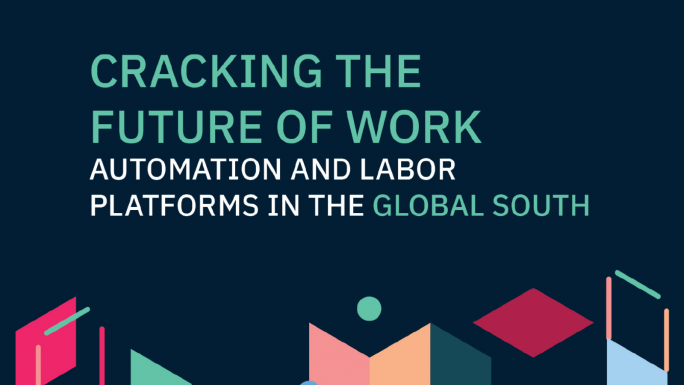FOWIGS Book launch “Cracking the future of work. Automation and labor platforms in the Global South” with a chapter on the Fairwork project in Ecuador, Chile and Indonesia.

By Jean-Paul Van Belle & Pitso Tsibolane.
The end of a very exciting Global-South collaborative research project was celebrated in the release of the open book “Cracking the future of work. Automation and labor platforms in the Global South”. This book reports on a number of projects looking at the Future of Work in the Global South (FOWIGS). Coordinated by CIPPEC and funded by the IDRC, FOWIGS is a “network of think tanks from southern regions that brings data and knowledge together to build evidence-based narratives on the Future of Work [and] contribute to the policy frameworks from and for developing countries”. One of the projects under FOWIGS had the objective of sharing the experience of the Fairwork project in South Africa – one of the original pilot locations for the project – with other Global South partners. From the more than 40 research teams who pitched their interest, three teams from Indonesia, Ecuador and Chile team were selected to apply the Fairwork methodology in their respective countries, resulting in a first round of ratings of gig platforms in these countries. The Chile and Ecuador ratings for 2021 are already available, with the Indonesia scores being announced later this year.
The 254-page open book, edited by Ramiro Albrieu, was launched on 26 October with a webinar where each of the contributing teams presented a summary of their empirical findings and policy recommendations. These fell largely into two main themes: the trend towards increasing automation and the issues around how gig work platforms change the shape and nature of work in developing countries. As part of the latter domain, the chapter “Fairwork in the Platform Economy: A Global South Perspective” summarizes the work done by the Fairwork teams in Ecuador, Chile and Indonesia. The chapter authors, and principal researchers of these countries, are Pitso Tsibolane, Maria Belen Albornoz, Arturo Arriagada, Treviliana Eka Putri, Jean-Paul Van Belle, Henry Chavez, Richard Heeks, Kelle Howson, Macarena Bonhomme, Jorge Leyton, Francisco Ibáñez, Louise Bezuidenhout and, of course, Fairwork’s leading light, director Mark Graham. Due to the COVID-19 pandemic, some of the initially planned activities such as collaborative F2F workshops were not possible. But in the end all teams succeeded – and exceeded – in the initial objectives of knowledge transfer, team capacity building and rating the major platforms operating in the selected countries. Going forward, these teams will build on the initial momentum to continue working towards improving conditions in the local gig economy through more yearly ratings. Apart from the Fairwork project, the book also contains interesting and thought-provoking chapters from the other research projects on issues such as digital entrepreneurship and women in India, how new technologies impact jobs in South America, or gender differences in routine task automation.